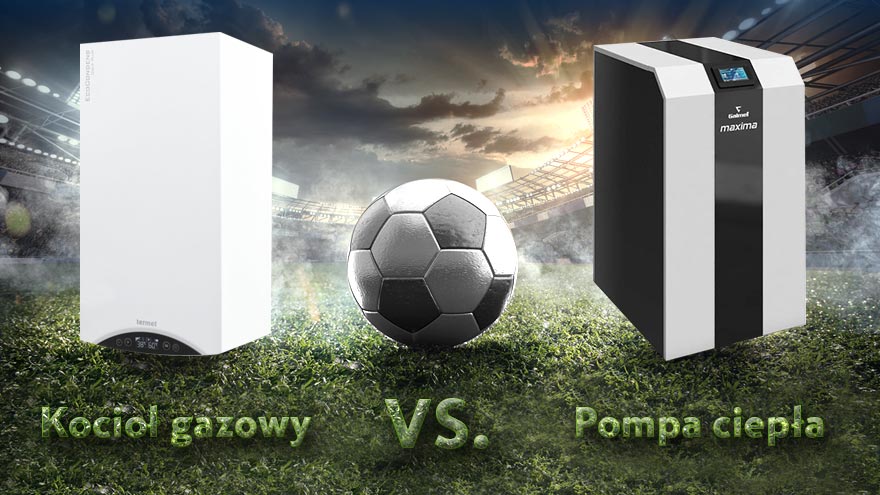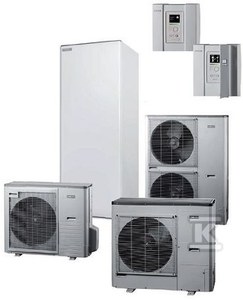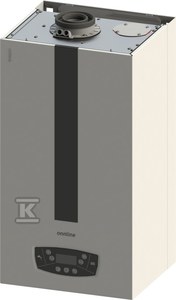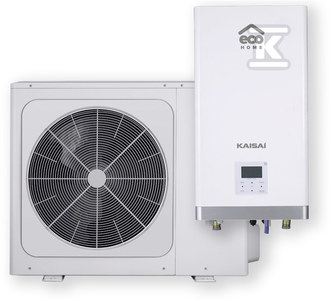Heating costs can consume a huge part of the budget of any industrial plant. A very important issue is therefore the selection of an appropriate heat source that will remain a relatively economical solution with the highest possible efficiency. Until recently, gas heating was a profitable option. Today the situation is slightly different, and heat pumps are among the most advantageous systems. How do both sources work and which is better to choose for the industry? What should you pay attention to when recommending the best solution to clients?

From this article you will learn:
- what are the characteristics of gas heating and heat pump heating,
- what are the heating costs with both methods,
- which heating system is more profitable and ecological.
Advantages and disadvantages of a heat pump
 A heat pump is a modern, maintenance-free heating device that obtains heat energy from a lower source, i.e. air, ground or water. It is then sent to the overhead source, i.e. to the central heating and hot water installations. This process requires the participation of electricity supplied from outside to drive the compressor. This means that approximately 75% of the heat comes from renewable energy sources and only 25% from burning fuels in power plants.
A heat pump is a modern, maintenance-free heating device that obtains heat energy from a lower source, i.e. air, ground or water. It is then sent to the overhead source, i.e. to the central heating and hot water installations. This process requires the participation of electricity supplied from outside to drive the compressor. This means that approximately 75% of the heat comes from renewable energy sources and only 25% from burning fuels in power plants.
The most popular type of this device is an air heat pump, which obtains energy from the building's surroundings. However, ground pumps, characterized by a high level of efficiency, are also widely used in industry. The associated investment costs are, of course, proportionately higher.
The advantages of heat pumps are numerous. The most important include:
- energy efficiency,
- low heating costs,
- ecological values,
- security,
- possibility of cooperation with photovoltaics,
- long service life,
- automatic control.
It is quite difficult to find disadvantages of heat pumps. These few include:
- high investment costs,
- dependence on electricity,
- noise in the case of air heat pumps (the noise level, however, still allows for normal use of the property).
It is worth noting here that although gas furnaces (or more precisely: boilers) were promoted in Poland as an alternative to coal furnaces until recently, currently the European Union is introducing new regulations. The installation of gas furnaces will soon be banned, and the recommended solution is heat pumps. As a result, the demand for gas furnaces has temporarily increased (due to their lower costs - many investors want to complete the installation before the new regulations come into force), but heat pumps will soon become more popular.
Advantages and disadvantages of gas heating
 A gas boiler is still one of the most popular heat sources in Poland. Like a heat pump, it is characterized by low emissions and maintenance-free operation. The gas condensing boiler has particularly favorable parameters, characterized by exceptionally high efficiency and low operating costs. This is all thanks to the fact that this device receives additional heat from exhaust gases.
A gas boiler is still one of the most popular heat sources in Poland. Like a heat pump, it is characterized by low emissions and maintenance-free operation. The gas condensing boiler has particularly favorable parameters, characterized by exceptionally high efficiency and low operating costs. This is all thanks to the fact that this device receives additional heat from exhaust gases.
In order for an industrial plant to use gas heating, it needs a gas connection. The cost of its implementation is not the lowest and oscillates around PLN 10,000. zloty. In such situations, it is often necessary to expand the gas pipeline, which is an even greater expense. If the facility is located outside the range of the gas network, it must install a special tank. In such a case, however, the investor will be personally responsible for all formalities related to the delivery of fuel.
Gas condensing boilers have numerous advantages, such as:
- high efficiency,
- no solid combustion products,
- high degree of automation,
- quick and simple assembly,
- low noise level,
- relatively low operating costs.
The disadvantages of gas heating include:
- high costs of purchasing and installing a boiler,
- the need to connect the installation to a gas pipeline,
- technical limitations in access to the gas network,
- periodic inspection of gas lines and ventilation ducts,
- potential risk of explosion or poisoning if improperly operated.
Heat pump or gas - which is more profitable?
As you can see, both solutions described above are modern, relatively inexpensive to operate and ecological ways to heat any industrial plant. The choice between them should first be determined by the specificity of the building and its plot:
- If a natural gas connection is not an option and the available space does not allow for the installation of a liquid gas tank, it will be advisable to use a heat pump.
- However, if the area is not favorable for installing a ground heat pump and the air one does not guarantee sufficient efficiency, natural gas heating will be a better solution.
In many situations, however, the final decision will come down to costs - both investment and operating costs. This criterion seems even more important since gas prices have increased dramatically in the face of recent geopolitical events. This makes the advantage of the heat pump visible, which is complete independence from the market situation. The electricity necessary to operate the device can be obtained, for example, by connecting it to a photovoltaic installation.
Investment cost of a heat pump and a gas boiler
First, let's take a closer look at investment costs. In the case of a gas condensing boiler, the following elements should be taken into account:
- gas connection - approx. 10 thousand zloty,
- ventilation and exhaust system - approx. 3 thousand zloty,
- purchase and installation of a condensing boiler - approx. PLN 10,000 zloty.
When choosing a heat pump, you must take into account the following expenses: purchase and installation of the device:
- You can buy and install an air heat pump for PLN 40,000 - PLN 60,000. zloty.
- A ground heat pump costs between PLN 50,000 and PLN 80,000. PLN, to which should be added the costs of drilling. The cost of drilling and connecting to the building is approximately PLN 100-120 per meter.
As you can see, the amount of investment costs definitely favors heating the building with gas. However, you should also take into account the expenses related to the operation of both heating systems...
Annual cost of heating with a heat pump and gas
The efficiency of the heating system will depend not only on the efficiency of the device itself, but also on external conditions and the quality of insulation. The better the insulated building, the lower the annual heating costs. However, the price of a specific fuel will have a decisive impact on this value. Currently, 1 kWh of thermal energy costs:
- PLN 0.165 in the case of a ground heat pump (price of electricity in the G11 tariff),
- PLN 0.196 in the case of an air heat pump (price of electricity in the G12 tariff),
- PLN 0.292 in the case of natural gas,
- PLN 0.481 in the case of liquid gas.
As you can see, in terms of operating costs, ground heat pumps are the most profitable choice. This type of heating is about twice cheaper than using a gas heating system. It is therefore easy to see that the larger expenses related to the purchase and installation of the pump will pay off relatively quickly.
You will find an efficient heat source in the Onninen offer
 If you decide to heat your building with a heat pump, be sure to check out the assortment of our online wholesaler. Onninen's offer includes, among others, efficient air and ground pumps:
If you decide to heat your building with a heat pump, be sure to check out the assortment of our online wholesaler. Onninen's offer includes, among others, efficient air and ground pumps:
- KAISAI ARCTIC ,
- IMMERGAS MAGIS PRO ,
- VAILLANT VWL ,
- NIBE BA-SVM ,
- NIBE F2120,
- AUREA M 10 kW ,
- R32 3-PHASE, 16 kW ,
- MAXIMA 28 GT .
When choosing a heat pump for an industrial plant, consider not only financial aspects, but primarily the efficiency of the devices and the facility's demand for thermal energy. At Onninen you can easily find products that will meet all your requirements!
Take advantage of the help of Onninen's Technical Advisory Department